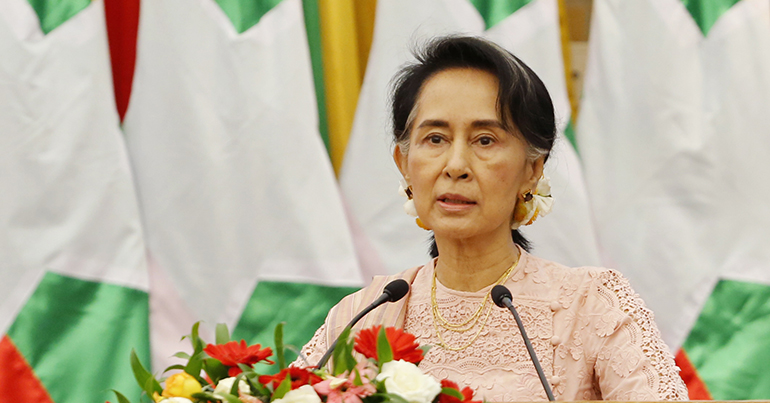The Myanmar military has been accused of indiscriminately targeting civilian in its newly announced war “against terrorism” after coordinated attacks on police posts

Over one hundred Rohingya militants and civilians have been killed in response to Friday’s coordinated attacks on 30 police posts and an army base in Rakhine State, the office of state counsellor Aung San Suu Kyi has announced. Reports from activists, rights groups and local residents suggest that the number of deaths could be closer to 800.
According to the government of Myanmar, 104 people, including 12 members of the security forces, were killed since the coordinated attacks, which Suu Kyi described as “a calculated attempt to undermine the efforts of those seeking to build peace and harmony in Rakhine state” in a statement released on Friday.
Suu Kyi’s government claims the military’s recent crackdown has been a proportionate response to the rising threat of Islamic terror in Rakhine State, and members of the military have been quick to emphasise the difficulty in distinguishing between combatants and civilians in what they have described as a new war “against terrorism”.
The state counsellor’s office has also ordered the country’s media to use the term ‘terrorist’ rather than ‘insurgent’ to describe Rohingya militants, a move that reaffirms the widely held belief that the former Nobel Peace Prize winner is unlikely to take any public stance against the military’s actions in the country’s troubled northwest.
“All the villagers become insurgents, what they’re doing is like a revolution,” an army official based in Rakhine told the Straits Times. “They don’t care if they die or not. We can’t tell who among them are insurgents.”
However, a number of reports, supported by pictures and videos posted online, contradict the government’s narrative and suggest the military has indiscriminately attacked innocent civilians.
A Bangladeshi official told Matthew Smith, CEO of the human rights group Fortify Rights, on Sunday that Myanmar troops had opened fire on fleeing Rohingya civilians – groups mainly comprised women and children.
In addition to significant fatalities, the recent conflict has also driven between 5,000 and 10,000 people from their home, according to Ro Nay San Lwin, a Rohingya activist based in Europe, who said mosques and madrasas had been burned to the ground, and the civilian population left without aid or assistance.
“There has been no help from the government, instead people’s homes have been destroyed and their goods looted,” he told Al Jazeera. “Without food, shelter and protection, they don’t know when we’ll be killed.”
Suu Kyi’s handling of the Rohingya crisis has been met with fierce criticism from the international community, which once lauded her as a valiant defender of human rights. Her defenders say that any effort to stand up for the Rohingyas, a widely reviled minority in Myanmar, would be political suicide.
In an interview with the BBC in April, the country’s de facto leader said that “ethnic cleansing is too strong an expression to use for what is happening”. On Monday, Suu Kyi accused international aid workers of helping “terrorists”, comments that Human Rights Watch said lacked evidence and were “profoundly irresponsible”.
Since the violence erupted once again this weekend, thousands of Rohingya have attempted to find refuge in neighbouring Bangladesh, though there are fears that many of the 2,000 who have crossed the border since Friday will be forcibly returned, with reports claiming that 90 Rohingya have already been made to do so.
Myanmar military invokes war on terror as Rakhine violence continues
The Myanmar military has been accused of indiscriminately targeting civilian in its newly announced war “against terrorism” after coordinated attacks on police posts Myanmar's State Counselor Aung San Suu Kyi delivers a speech during a ceremony for the National Health Plan (2017-2021) at the Myanmar International Convention Center in Naypyitaw, Myanmar, 31 March 2017. Photo: EPA/Hein Htet

